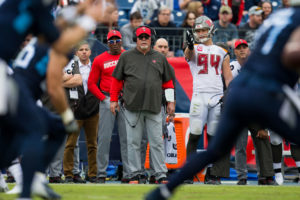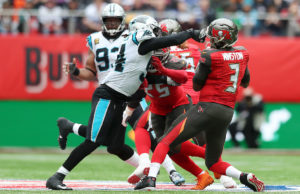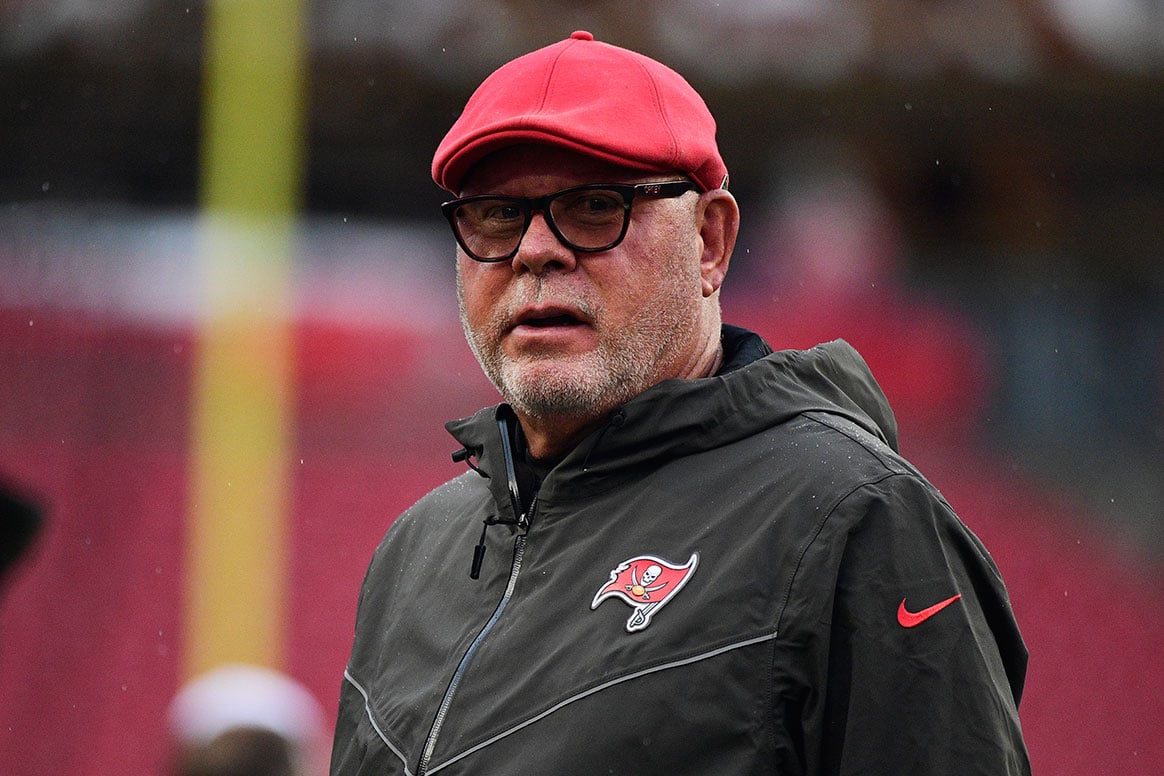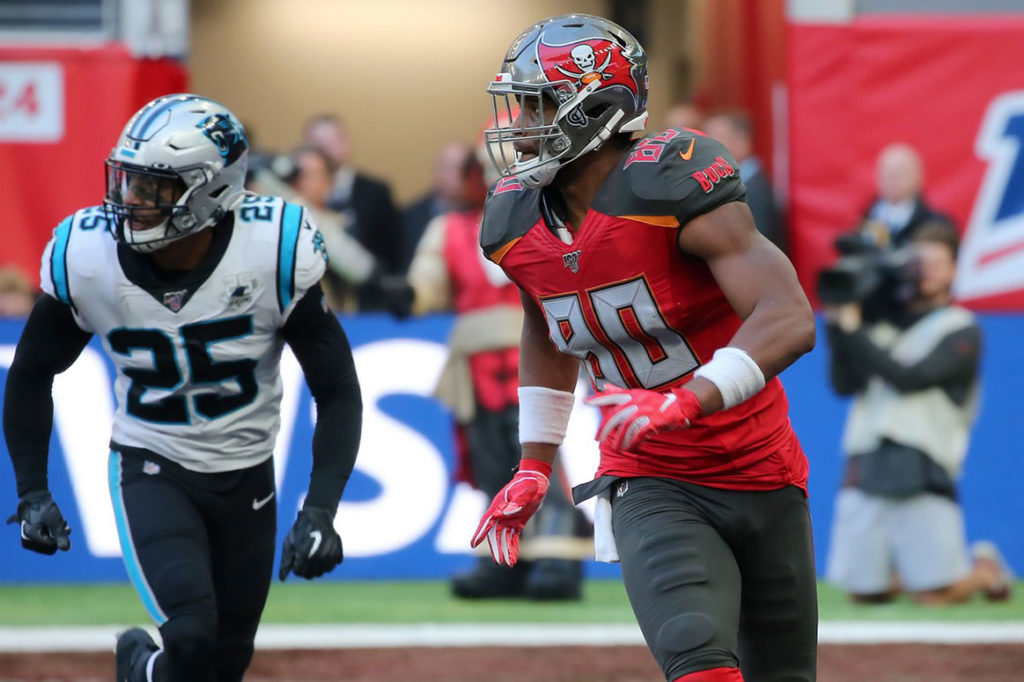FAB 3. Bucs’ 6-Week Odyssey Is Finally Over
The last time the Bucs played at Raymond James Stadium was on September 22. Since then, Tampa Bay has played five straight games on the road, including a “home game” in London against Carolina, which was an absolute disaster in a turnover-filled 37-26 loss.
The Bucs have been away so long that they will be celebrating Breast Cancer Awareness this Sunday against the visiting Arizona Cardinals – on November 10.
Breast Cancer Awareness month was in October.

Raymond James Stadium – Photo by Getty Images
“Hey, we have a home game!” said Bucs defensive tackle Beau Allen, who recorded his first sack of the season last Sunday at Seattle. “That’s crazy. It’s been awhile. There is a lot of things he has seen in the NFL and the accumulative affects that a lot of road games can have on you. It’s showing a lot of faith in us and we need to prove him right and perform on Sunday.”
Every Buccaneer I spoke with this week was amazed the team was actually not going to board an airplane this weekend.
“It’s going to be a little foreign for sure,” Tampa Bay tight end Cameron Brate said. “Guys are excited. Obviously we wish we were a little higher in the standings right now. We didn’t finish the second quarter of the season the way we wanted to. Hopefully we can feed off the crowd and get a win on Sunday.”
Tampa Bay left guard Ali Marpet said the five-game road stretch took a toll on the team physically.
“We’re playing at home for the first time in a while,” Marpet said. “We’re excited for it. For us, physically, it will be nice for us to not have that flight to zap your legs and mess with your joints. It will be nice to be at home in front of our fans in a must-win situation for us, obviously.”
Recognizing that his team was road weary from Sunday’s game in Seattle, Arians decided to forgo the team’s practice and just hold a walk-through on Wednesday.

Bucs head coach Bruce Arians – Photo by: Mary Holt/PR
“The travel, the extra plays in the ball game – all those things [led to that decision],” Arians said. “We’re a little bit tired so we made sure that this was more of a mental practice and preparation.”
The players absolutely appreciated Arians’ gesture.
“It’s tremendous,” Marpet said. “I believe we’ve done everything we can to give us a competitive edge from a physical standpoint given the schedule. The schedule … is the schedule.”
Ah, yes. The schedule.
Travelling across the country – or across the Atlantic – is brutal from a mental exhaustion standpoint, and also physically sitting in small, uncomfortable seats for hour after hour, especially for 300-pounders like Marpet.
Over the second half of the season Tampa Bay has five of its remaining eight games at home, including back-to-back home games against the Cardinals and the Saints before two short back-to-back road trips to Atlanta and Jacksonville. Then the Bucs will welcome the Colts before their last road trip to Detroit, followed by home games against the Texans and Falcons.
The good news is that Tampa Bay’s odyssey is over, and because the league royally screwed the Bucs’ schedule up this year, next year the team should receive some preferential treatment. Because Tampa Bay traveled to London this past year it won’t be selected for an NFL International Game in 2020.

Bucs QB Jameis Winston –
photo by: Getty Images
And the even better news is that the Bucs, who are 2-6 on the road – including the loss at London, which was far from being a “home game” – won’t have to travel nearly as far next year. Before we take a look at the team’s travel destinations in 2020, let’s add up the miles and flight time from this year’s schedule.
Tampa Bay’s 2019 Travel
London – 8 hours 53 mins – 4,428 miles one way
Seattle – 5 hours 15 mins – 2,532 miles one way
Los Angeles – 4 hours 31 mins – 2,156 miles one way
Detroit – 2 hours 18 mins – 993 miles one way
Carolina – 1 hour 36 mins – 576 miles one way
Nashville – 1 hour 35 mins – 621 miles one way
New Orleans – 1 hour 32 mins – 481 miles one way
Atlanta – 1 hour 23 mins – 416 miles one way
Jacksonville – 48 mins – 171 miles one way
Now double those miles and flight times to account for a round trip, and the Bucs are slated to fly a whopping 24,748 miles and log 55 hours and 42 minutes on planes this year when it’s all said and done.
While Tampa Bay’s 2020 schedule won’t be released until April, and its opponents won’t be finalized until the end of the 2019 campaign, we can do some projections based on the current NFL standings to see which team the Bucs will play. It seems likely that the 2-6 Bucs will finish either third or fourth in the NFC South division this year, depending on how the 1-7 Falcons fare.
The Bucs will be playing the NFC North and AFC West divisions next year, in addition to their regular NFC South foes. The other teams the Bucs will play will be the corresponding teams in the NFC East and NFC West. That will either be the Los Angeles Rams or the Arizona Cardinals for the unknown opponent home game, and either the New York Giants or the Washington Redskins for the unknown opponent road game.
So with a trip to Las Vegas for the first time to play the Raiders, along with flights to Denver, Chicago, Detroit, Carolina, New Orleans and Atlanta already set, it will come down to either Washington or New York next year for the Bucs’ eighth road game.
Tampa Bay’s 2020 Travel
Las Vegas – 4 hours 12 mins – 2,013 miles one way
Denver – 3 hours 19 mins – 1524 miles one way
*NFC East NY Giants – 2-7 – 2 hours 20 mins – 1,004 miles one way
Chicago – 2 hours 19 mins – 1,006 miles one way
Detroit – 2 hours 18 mins – 993 miles one way
*NFC East Washington – 1-8 – 1 hour 58 mins – 819 miles one way
Carolina – 1 hour 36 mins – 576 miles one way
New Orleans – 1 hour 32 mins – 481 miles one way
Atlanta – 1 hour 23 mins – 416 miles one way
*Bucs’ NFC East road opponent to be determined in January 2020.

Giants RB Saquon Barkley – Photo by: Getty Images
So if the Bucs have to travel to New York, Tampa Bay will log 16,026 round trip miles and 37 hours and 58 minutes of round trip flight time. If the Bucs face the Redskins in D.C. the team will travel 15,656 round trip miles and be in the air 36 hours and 54 minutes round trip.
So what’s the difference in travel mileage and travel time from this year to next year? If the Bucs travel to D.C. next year the team will fly 9,092 fewer miles and spend 18 and a half fewer hours in the air. If Tampa Bay heads to New York, the Bucs will fly 8,722 fewer miles and spend about 18 fewer hours in the skies.
And just in case you are interested in which teams will be coming to Ray-Jay next year, those opponents are already known – with the exception of the NFC West opponent.
Tampa Bay’s 2020 Home Opponents
Green Bay
Minnesota
Kansas City
LA Chargers
Carolina
Atlanta
New Orleans
NFC West – LA Rams (currently 3rd in division)
– OR –
NFC West – Arizona (currently 4th in division)
Next year is next year, and the Bucs are just happy to only have to board a plane for three more trips in 2019.
“It’s good to get back home,” Bucs right tackle Demar Dotson said. “Unfortunately we had a long road stretch where we lost some games that we needed. Now we have to go back home and win a football game. Whether we’re home or away we need a win. Fortunately, we’re at home, but that doesn’t mean that we don’t have a good football team coming in here and we have to stop beating ourselves and win a football game.”

Bucs QB Jameis Winston – Photo by: Mark Lomoglio/PR
Despite a 2-6 record, the fact that the Bucs will be playing in Raymond James Stadium for just the third time this season has boosted the team’s confidence and lifted its spirits – at least for a week.
“Well, we’ve enjoyed our golden tour, but we are happy to be back at [Raymond James Stadium],” Bucs quarterback Jameis Winston said. “We can’t focus on what’s behind us. We focus on this week, taking it day-by-day. It’s the midpoint of the season, so we are trying to turn this thing around.”
Scott Reynolds is in his 30th year of covering the Tampa Bay Buccaneers as the vice president, publisher and senior Bucs beat writer for PewterReport.com. Author of the popular SR's Fab 5 column on Fridays, Reynolds oversees web development and forges marketing partnerships for PewterReport.com in addition to his editorial duties. A graduate of Kansas State University in 1995, Reynolds spent six years giving back to the community as the defensive coordinator/defensive line coach for his sons' Pop Warner team, the South Pasco Predators. Reynolds can be reached at: [email protected]




